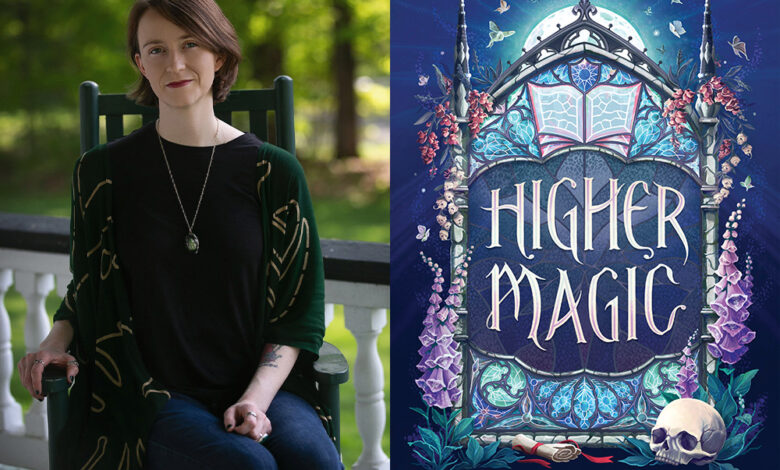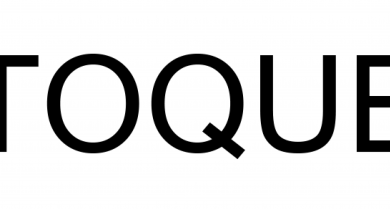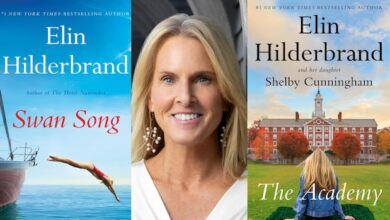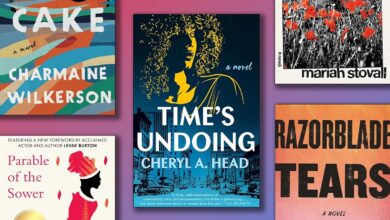Q&A: Courtney Floyd, Author of ‘Higher Magic’

We chat with author Courtney Floyd about Higher Magic, which follows a struggling mage student with intense anxiety must prove that classic literature contained magic—and learn to wield her own stories to change her institution for the better.
Hi, Courtney! Can you tell our readers a bit about yourself?
Hello, hello! I’m Courtney Floyd, and I write grounded fantasy and audio fiction. My stories tend to come with a large helping of irreverent (but affectionate) literary allusions, because I have three degrees in English lit and I deeply love stories about stories. When I’m not writing, I spend most of my time splashing through local rivers with my dogs and taking pictures of interesting mushrooms and trees.
When did you first discover your love for writing and stories?
I started reading when I was three or four years old, so I can’t remember a time when I wasn’t diving headlong into stories. I wrote my first “books” on stapled printer paper in crayon at around seven or eight years old. The very first was Louisa May Alcott fanfic, which I titled “The Aunt Farm,” just to give you a sense of how far back the irreverent literary allusions truly go.
Quick lightning round! Tell us:
- The first book you ever remember reading: The Foot Book by Dr. Seuss.
- The one that made you want to become an author: It was probably a combination of Little Women, the Dear America series, and Elizabeth George Spear’s The Witch of Blackbird Pond. Fantasy snuck up on me as I got older.
- The one that you can’t stop thinking about: Bram Stoker’s Dracula. I didn’t read it until grad school, and now I have four copies, an Edward Gorey illustrated pop-up set, a dissertation chapter I wrote about it, and a poem I published about Renfield. I love the way Stoker uses archives and information technology structurally, the found family vibes, and every single thing about Mina. (Give me enough coffee and I’ll start infodumping about how it’s an important precursor to dark academia!)
Your debut novel, Higher Magic, is out October 7th! If you could only describe it in five words, what would they be?
Whimsical, compassionate, and fiercely intelligent. (Thanks, blurbers!)
What can readers expect?
Higher Magic sits on the line between dark and light academia, bringing elements of both into conversation. There’s lighthearted whimsy and coziness, but there are also serious stakes and the encroaching rot at the heart of the institution that readers might expect from dark academia. I wanted Higher Magic to feel authentic to my grad school experience, so research and teaching play big (and plot-relevant) roles. At the heart of it all, disability justice, found family, and belonging drive the story.
Where did the inspiration for Higher Magic come from?
I really love the way V. E. Schwab talks about “story ingredients” instead of single-origin inspiration. There were lots of ingredients that led me to write Higher Magic. My time in graduate school was a major inspiration. I studied the rise of the novel, and reading the work of scholars including Ian Watt and Nancy Armstrong changed the way I thought about novels and what they could do. In a book called Desire and Domestic Fiction, Armstrong argued that novels (including Jane Austen’s works) changed the way the British middle class imagined itself, leading to a more cohesive middle class identity in the real world. That really stuck with me, and it became one of the core pieces of Bartleby’s exam project. At the same time, I drew a lot on a subfield called Digital Humanities which I had engaged with as a scholar and worked in at the start of my career after grad school. There are lots of early articles about computers and humanities and whether the two are compatible that informed my approach to writing a technology-entwined magical methodology.
Were there any moments or characters you really enjoyed writing or exploring?
So many! One of my favorite things was incorporating more of Anne, my protagonist’s haywire exam spell, in later drafts. Anne is a Jane-Austen-spouting skull that quickly begins to narrate Bartleby’s internal life in a way that complicates things and annoys Bartleby to no end. The skull was an immediate fan favorite from my first round of beta readers onward, and it gave me the perfect excuse to include plot-relevant spreadsheets in the book. Truly, a life goal for this nerdy author.
Did you face any challenges whilst writing? How did you overcome them?
My biggest challenge is always getting in a hurry. Grad school taught me how important it is to sit with and even live in projects, in all their messy and frustrating ambiguity. Giving big things time to ruminate so that I can see connections, and places where the story I’m telling can be deepened, is so important to my process. But I was a Type A student and I’m now a Type A author. I always convince myself I should be able to get my stories right on the first draft, and that causes lots of problems (and writer’s block). Writing is a lot like magic, as it exists in my novel. It’s an argument with reality that can transport us into different worlds, suspend our disbelief, make us feel less alone, and enrich our lives. It takes time to get that argument just right.
This is your debut novel! What was the road to becoming a published author like for you?
Despite the fact that I’ve been writing all of my life (and even queried a few things, extremely prematurely, as a teen and in my early 20s), it wasn’t until I finished my PhD and wrote an audio drama series that I finally gave writing for publication a real try.
As a first-generation scholar from a rural, working class background, a writing career seemed as implausible and risky to pursue as acting or professional sports. Some people made it, but by and large they weren’t people like me. Or, that’s what I convinced myself. Going all in on something you’re passionate about can be incredibly terrifying. I think part of me kept holding back because if I didn’t go all in, I couldn’t really fail.
After my PhD, I had a now-or-never moment. Either I’d give it a real shot or I’d spend the rest of my life noodling on unfinished drafts and wondering what could have been.
Writing and releasing my cozy horror audio drama series, The Way We Haunt Now, was my way in. The audio drama community was incredibly supportive, and it turns out that writing what amounted to 3 hours of dialogue-first story was a crash course in characterization and perspective and pacing. It gave me the confidence to sit down and write a first draft of Higher Magic in the fall of 2021 with the plan to query and see where it took me. It also taught me how to revise—which I did a lot of before signing with my fantastic agent, Rebecca Matte, in 2023.
From the outside looking in, my timeline from first draft to publication might not seem terribly long. But there were decades of writing and second-guessing and learning my craft that got me to that point. Time and perspective made me a better writer with a clearer sense of my own voice. The rest was luck. I didn’t imagine for one second that the manuscript I was querying might sell. My highest ambition for it was to find an agent and get a foot in the door. But Higher Magic was timely in a way I couldn’t have anticipated, and I’m honestly still reeling I get to share it with the world.
What’s next for you?
I have several projects in the works, but can’t say much about any of them yet except that three out of four involve ghosts. So, one way or another what’s next for me is probably some intense haunting. If I make it through revisions alive, I’ll send my ghosts out into the world as soon as I can.
Lastly, what books have you enjoyed reading this year? Are there any you’re looking forward to picking up?
It has been a fantastic reading year. Some of my favorites were Amal El Mohtar’s The River Has Roots, Emily Tesh’s The Incandescent, and MK Hardy’s The Needfire.
I’ve been hearing phenomenal things about Deandra Davis’s All The Noise at Once, so I’m looking forward to sitting down with that one soon. I’m also waiting with an extreme lack of chill for Beatrice Winifred Iker’s I’ll Make a Spectacle of You (out in November!) and Danai Christopoulou’s Vile Lady Villains (summer 2026).
Will you be picking up Higher Magic? Tell us in the comments below!
Source link




